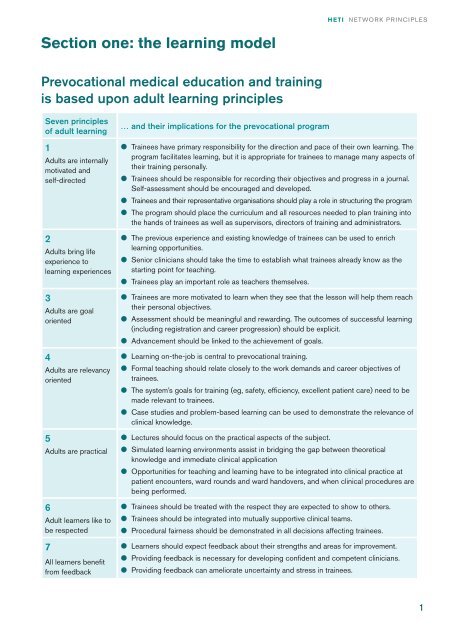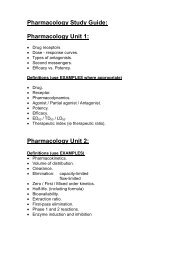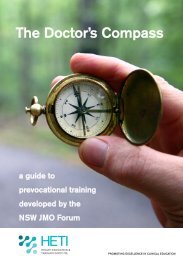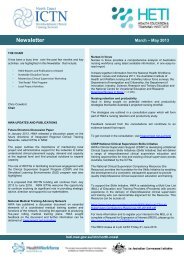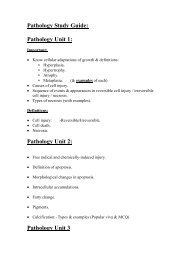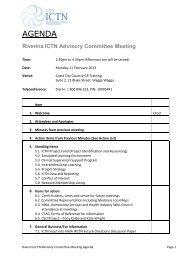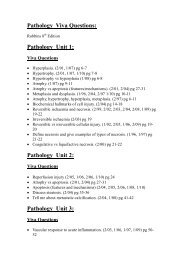Network principles for prevocational medical training - HETI
Network principles for prevocational medical training - HETI
Network principles for prevocational medical training - HETI
You also want an ePaper? Increase the reach of your titles
YUMPU automatically turns print PDFs into web optimized ePapers that Google loves.
<strong>HETI</strong> NETWORK PRINCIPLES<br />
Section one: the learning model<br />
Prevocational <strong>medical</strong> education and <strong>training</strong><br />
is based upon adult learning <strong>principles</strong><br />
Seven <strong>principles</strong><br />
of adult learning<br />
1<br />
Adults are internally<br />
motivated and<br />
self-directed<br />
2<br />
Adults bring life<br />
experience to<br />
learning experiences<br />
3<br />
Adults are goal<br />
oriented<br />
4<br />
Adults are relevancy<br />
oriented<br />
5<br />
Adults are practical<br />
6<br />
Adult learners like to<br />
be respected<br />
7<br />
All learners benefit<br />
from feedback<br />
… and their implications <strong>for</strong> the <strong>prevocational</strong> program<br />
• z Trainees have primary responsibility <strong>for</strong> the direction and pace of their own learning. The<br />
program facilitates learning, but it is appropriate <strong>for</strong> trainees to manage many aspects of<br />
their <strong>training</strong> personally.<br />
• z Trainees should be responsible <strong>for</strong> recording their objectives and progress in a journal.<br />
Self-assessment should be encouraged and developed.<br />
• z Trainees and their representative organisations should play a role in structuring the program<br />
• z The program should place the curriculum and all resources needed to plan <strong>training</strong> into<br />
the hands of trainees as well as supervisors, directors of <strong>training</strong> and administrators.<br />
• z The previous experience and existing knowledge of trainees can be used to enrich<br />
learning opportunities.<br />
• z Senior clinicians should take the time to establish what trainees already know as the<br />
starting point <strong>for</strong> teaching.<br />
• z Trainees play an important role as teachers themselves.<br />
• z Trainees are more motivated to learn when they see that the lesson will help them reach<br />
their personal objectives.<br />
• z Assessment should be meaningful and rewarding. The outcomes of successful learning<br />
(including registration and career progression) should be explicit.<br />
• z Advancement should be linked to the achievement of goals.<br />
• z Learning on-the-job is central to <strong>prevocational</strong> <strong>training</strong>.<br />
• z Formal teaching should relate closely to the work demands and career objectives of<br />
trainees.<br />
• z The system’s goals <strong>for</strong> <strong>training</strong> (eg, safety, efficiency, excellent patient care) need to be<br />
made relevant to trainees.<br />
• z Case studies and problem-based learning can be used to demonstrate the relevance of<br />
clinical knowledge.<br />
• z Lectures should focus on the practical aspects of the subject.<br />
• z Simulated learning environments assist in bridging the gap between theoretical<br />
knowledge and immediate clinical application<br />
• z Opportunities <strong>for</strong> teaching and learning have to be integrated into clinical practice at<br />
patient encounters, ward rounds and ward handovers, and when clinical procedures are<br />
being per<strong>for</strong>med.<br />
• z Trainees should be treated with the respect they are expected to show to others.<br />
• z Trainees should be integrated into mutually supportive clinical teams.<br />
• z Procedural fairness should be demonstrated in all decisions affecting trainees.<br />
• z Learners should expect feedback about their strengths and areas <strong>for</strong> improvement.<br />
• z Providing feedback is necessary <strong>for</strong> developing confident and competent clinicians.<br />
• z Providing feedback can ameliorate uncertainty and stress in trainees.<br />
1


